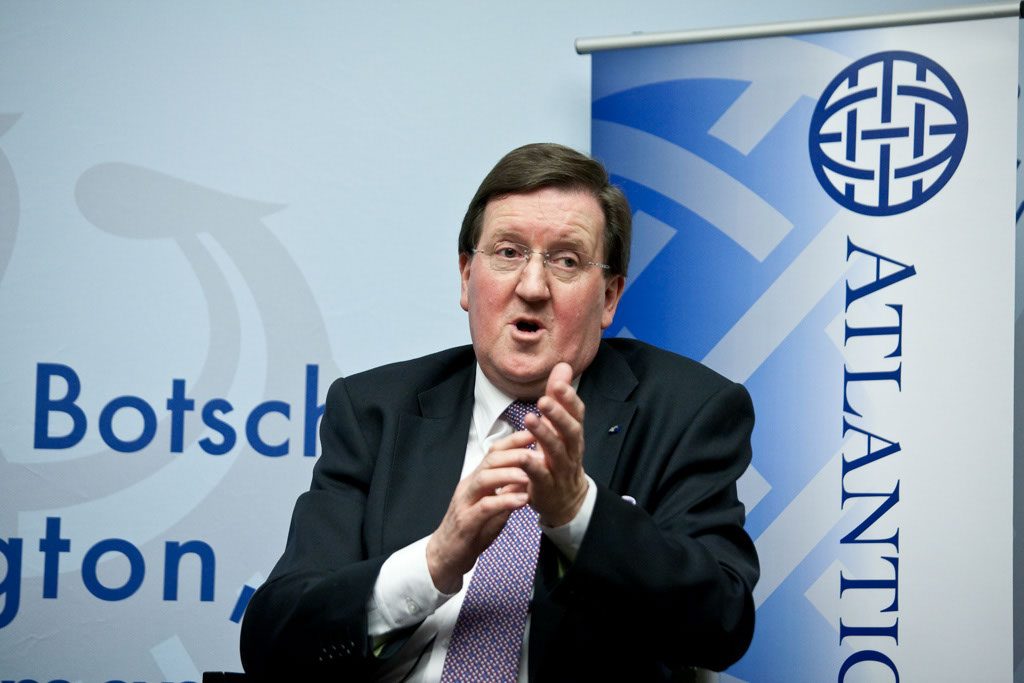
Lord George Robertson, NATO Secretary General from 1999 to 2004, says that the Alliance and its constituent members are "on the edge of a precipice looking down on a
world of growing disorder and discontent and only blunt talk and straight language will save us from falling over."
The decision two weeks ago by the Dutch to end its participation in Afghanistan and the announcement by Canada that it will do the same is the harbinger of this dire moment. Robertson asked, "If these two robust allies and those who may be thinking of doing the same, and additionally those who contribute less than they should, can all shy away from their obligation stemming from the decision taken unanimously in 1993, what is it other than a crisis?"
Robertson’s speech to the Atlantic Council was the fourth Christopher J. Makins Lecture, an annual address on transatlantic relations by great leaders to honor the memory of a great transatlantic leader. Robertson’s predecessors have been Zbigniew Brzezinski, National Security Advisor to President Jimmy Carter, former Lativan President Vaira Vike-Freiberga, and former Secretary of State Henry Kissinger. The event was graciously hosted by Klaus Scharioth, Germany’s ambassador to the United States.
Reciting "the usual list" of NATO’s achievements over the past six decades — amazing though it may be — is no longer persuading the Allied publics of the value of the institution. And, despite the shocking attacks that caused Article 5 to be invoked for the first time, "Public opinion in Germany, in France, in Italy and Spain and even in the UK is all swinging to troop
withdrawal and the raising of hands."
Robertson says the blame rests squarely with the leadership of NATO’s member states, who "do not explain with sufficient force and passionate conviction why being in Afghanistan, and winning there, matters to the peace and security and safety of people a continent and a half away."
He notes that, in the spring of 1940, things were dire, indeed. The Nazis had secured France, Britain appeared defeated, and the United States was still sitting on the sidelines. But, Robertson contends, "The fact that we are free people today is due mainly to the fact that Winston Churchill inspired the British people to not accepting or even contemplating defeat. " This "triumphant psychological approach" by the leadership of the UK "simultaneously rallied the people of Britain and rattled Adolf Hitler and it transcended the facts on the ground which looked so bleak. " Robertson urges Allied leaders to "take note."
More recently, NATO’s leaders rallied "publics across the world" through a relentless, daily media campaign with the simple message "NATO in, Serbs out, refugees home." A daily press conference in London was followed by one in Brussels and then one in Washington throughout the campaign.
In Afghanistan, however, it is the enemy who is using the media against us. While Allied leaders only occasionally talk about the war, "The Taliban watch and monitor and
superbly use the old and the newest media. They calibrate their intensive lED attacks with the fragility of our public opinion. They mobilize money on the ground to outspend us and it is they, not us with our demands for pullout dates, who say they will continue until they win and throw us out."
Robertson did not mince words: "The fact is that in Afghanistan we can make it work, or we can let it fail. Our choice."
Alas, as a German journalist in the Q&A noted, we are not facing the equivalent of 1940. Then, the war was barely getting underway. By contrast, NATO has been fighting in Afghanistan for more than eight years. Much longer, in fact, than the entirety of World War II.
It may well be that 28 Winston Churchills, one in each NATO state, would not be enough at this juncture. Indeed, while we didn’t have a Churchill, we did have a Tony Blair, who passionately and articulately advocated for the fights in both Iraq and Afghanistan for years to decreasing effect. And, of course, we had a George Robertson as the voice of the Alliance during the first several years of the NATO mission in Afghanistan. It’s quite possible that the problem wasn’t the messenger but the message itself .
James Joyner is managing editor of the Atlantic Council.
Image: robertson-makins-closeup.jpg
